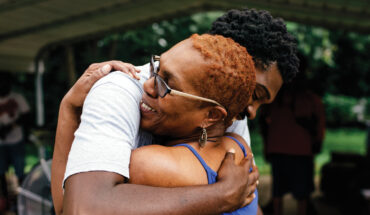TJ Hoover, left, in a recent picture with his sister, Donna Rhorer. In October 2021, Hoover was declared dead and on the brink of having his organs removed to be transplanted into other people. The surgery was halted in the operating room.
Hoover Rhorer Family
hide caption
toggle caption
Hoover Rhorer Family
Natasha Miller says she was getting ready to do her job preserving donated organs for transplantation when the nurses wheeled the donor into the operating room.
She quickly realized something wasn’t right. Though the donor had been declared dead, he seemed to her very much alive.
“He was moving around — kind of thrashing. Like, moving, thrashing around on the bed,” Miller told NPR in an interview. “And then when we went over there, you could see he had tears coming down. He was crying visibly.”
The donor’s condition alarmed everyone in the operating room at Baptist Health hospital in Richmond, Ky., including the two doctors, who refused to participate in the organ retrieval, she says.
“The procuring surgeon, he was like, ‘I’m out of it. I don’t want to have anything to do with it,’ ” Miller says. “It was very chaotic. Everyone was just very upset.”
Miller says she overheard the case coordinator at the hospital for her employer, Kentucky Organ Donor Affiliates (KODA), call her supervisor for advice.
“So the coordinator calls the supervisor at the time. And she was saying that he was telling her that she needed to ‘find another doctor to do it’ – that, ‘We were going to do this case. She needs to find someone else,’ ” Miller says. “And she’s like, ‘There is no one else.’ She’s crying — the coordinator — because she’s getting yelled at.”
“Everybody’s worst nightmare”
The organ retrieval was canceled. But some KODA workers say they later quit over the October 2021 incident, including another organ preservationist, Nyckoletta Martin.
“I’ve dedicated my entire life to organ donation and transplant. It’s very scary to me now that these things are allowed to happen and there’s not more in place to protect donors,” says Martin.
Martin was not assigned to the operating room that day, but she says she thought she might get drafted. So she started to review case notes from earlier in the day. She became alarmed when she read that the donor showed signs of life when doctors tried to examine his heart, she says.
“The donor had woken up during his procedure that morning for a cardiac catheterization. And he was thrashing around on the table,” Martin says.
Cardiac catheterization is performed on potential organ donors to evaluate whether the heart is healthy enough to go to a person in need of a new heart.
Martin says doctors sedated the patient when he woke up and plans to recover his organs proceeded.
KODA officials downplayed the incident afterwards, according to Martin. She was dismayed at that, she says.
“That’s everybody’s worst nightmare, right? Being alive during surgery and knowing that someone is going to cut you open and take your body parts out?” Martin says. “That’s horrifying.”
The patient
Donna Rhorer of Richmond, Kentucky, told NPR that her 36-year-old brother, Anthony Thomas “TJ” Hoover II, was the patient involved in the case. He was rushed to the hospital because of a drug overdose, she says.
Rhorer was at the hospital that day. She says she became concerned something wasn’t right when TJ appeared to open his eyes and look around as he was being wheeled from intensive care to the operating room.
“It was like it was his way of letting us know, you know, ‘Hey, I’m still here,’ ” Rhorer told NPR in an interview.
But Rhorer says she and other family members were told what they saw was just a common reflex. TJ Hoover now lives with Rhorer, and she serves as his legal guardian.
TJ Hoover danced with his sister, Donna, on her wedding day in May 2023 — more than a year after he was mistakenly declared dead.
Hoover Rhorer family
hide caption
toggle caption
Hoover Rhorer family
The general outline of the incident was disclosed in September by a letter Nyckoletta Martin wrote to the House Energy and Commerce Committee, which held a hearing investigating organ procurement organizations. She later provided additional details about the case to NPR.
“Several of us that were employees needed to go to therapy. It took its toll on a lot of people, especially me,” Martin told NPR.
Investigations underway
The Kentucky state attorney general’s office wrote in a statement to NPR that investigators are “reviewing” the allegations.
The federal Health Resources and Services Administration (HRSA), which helps oversee organ procurement, said in a statement to NPR that the agency is “investigating these allegations.” And some people involved in the case told NPR they have answered questions from the Office of the Inspector General of the federal Department of Health and Human Services, though no federal official from that office has commented on the case.
Baptist Health Richmond, the Kentucky hospital where that incident allegedly occurred, told NPR in a statement:
“The safety of our patients is always our highest priority. We work closely with our patients and their families to ensure our patients’ wishes for organ donation are followed.”
“Not been accurately represented”
KODA, the organ procurement organization, confirmed that Miller was assigned to the operating room for the case. But the organization told NPR in a statement that “this case has not been accurately represented.
“No one at KODA has ever been pressured to collect organs from any living patient,” according to the statement from Julie Bergin, president and chief operating officer for Network for Hope, which was formed when KODA merged with the LifeCenter Organ Donor Network. “KODA does not recover organs from living patients. KODA has never pressured its team members to do so.”
Organ procurement system officials, transplant surgeons and others said that there are strict protocols in place to prevent unsafe organ retrieval from happening.
“Incidents like this are alarming. And we would want them to be properly reported and evaluated,” Dorrie Dils, president of the Association of Organ Procurement Organizations, told NPR in an interview. “And obviously we want to ensure that individuals are, in fact, dead when organ donation is proceeding. And we want the public to trust that that is indeed happening. The process is sacred.”
The accusations that emerged at the congressional hearing in September undermine trust in the organ donation system and have led to a drop in people signing up to be donors, according to an open letter released Oct. 3 by the organization.
“For over five years, our nation’s organ procurement organizations (OPOs) – the non-profit, community-based organizations that work with grieving families every day to save lives through transplantation – have been subject to malicious misinformation and defamatory attacks based on hearsay, creating a false narrative that donation and transplant in the U.S. is untrustworthy and broken,” the letter reads.
Others also fear such unnerving reports could undermine the organ transplant system.
“These are horrifying stories. I think they need to be followed up carefully,” says Dr. Robert Truog, a professor of medical ethics, anesthesia and pediatrics at Harvard Medical School who works as a critical care physician at Boston Children’s Hospital.
“But I really would not want the public to believe that this is a serious problem. I believe that these are really one-offs that hopefully we’ll be able to get to the bottom of and prevent from ever happening again,” Truog says.
103,000 people waiting for transplants
Some critics of the organ procurement system say they weren’t entirely surprised by the allegations. With more than 103,000 people on the waiting list for a transplant, organ procurement organizations are under enormous pressure to increase the number of organs obtained to save more lives. In addition, there is an ongoing debate about how patients are declared dead.
“I hope that a case like this really is extreme, but it does reveal some of those underlying issues that can arise when there are disagreements about the determination of death,” says Dr. Matthew DeCamp, an associate professor of Medicine and bioethicist at the University of Colorado.
But some wonder how rarely this happens.
“This doesn’t seem to be a one-off, a bad apple,” says Greg Segal, who runs Organize, an organ transplant system watchdog group. “I receive allegations like that with alarming regularity.”
Likewise, Thaddeus Pope, a bioethicist and lawyer at the Mitchell Hamline School of Law in Saint Paul who studies organ donation, cites similar accusations reported elsewhere.
“This is not a one-off,” Pope says. “It has been alleged to happen before.”
Another near miss described
Dr. Robert Cannon, a transplant surgeon at the University of Alabama at Birmingham, described a similar incident during the congressional hearing where Martin’s letter was disclosed. It happened at a hospital outside of Alabama.
“We actually were in the operating room. We had actually opened the patient and were in the process of sort of preparing their organs, at which point the ventilator triggered and so the anesthesiologist at the head of the table spoke up and said, ‘Hey, I think this patient might have just breathed,’” Cannon later told NPR in an interview. “If the patient breathes, that means they’re not brain dead.”
Nevertheless, a representative from the OPO wanted to proceed anyway, Cannon says. He refused.
“We were kind of shocked that an OPO person would have so little knowledge about what brain death means that they would say, ‘Oh, you should just go ahead.’ And we thought, ‘No. We’re not going to take any risk that we murder a patient.’ Because that’s what it would be if that patient was alive.”
“Why me?”
Since TJ’s release from the hospital, his sister, Donna Rhorer, says her brother has problems remembering, walking and talking.
When she asks TJ about what happened, she says he says: “Why me?”
“I do feel angry,” says Rhorer.
“I feel betrayed by the fact that the people that were telling us he was brain dead and then he wakes up,” Rhorer says. “They are trying to play God. They’re almost, you know, picking and choosing — they’re going to take this person to save these people. And you kind of lose your faith in humanity a little bit.”






